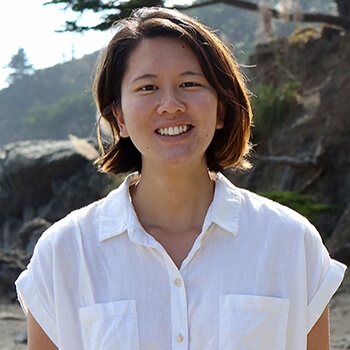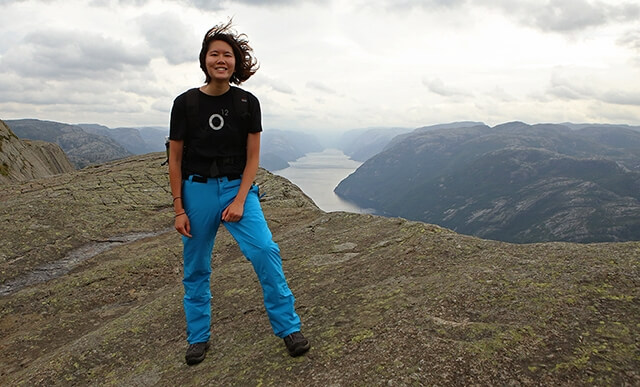Smoke from California’s raging wildfires had grown so thick over San Francisco that Heidi Lim couldn’t see more than a few feet out her office window in the city’s busy financial district.
That experience inspired her to leave her comfortable job at a software company and find a way to contribute to solving the intensifying climate crisis.
“I really care about climate change, environmental justice, and resource scarcity. I’d spent so much time reading about all these problems and feeling pretty terrible not doing anything about it,” recalled Lim, A.B. ’14, an environmental science and engineering concentrator at the Harvard John A. Paulson School of Engineering and Applied Sciences. “It just started weighing on me. I needed to go work on this problem.”
Lim landed at Opus 12, a nascent startup working on solutions to decarbonize heavy industry. The company is developing an electrochemical device that can transform CO2 into useful chemicals and fuels that are conventionally based on petroleum.
Lim stands at Preikestolen overlooking the Lysefjord in Norway. (Photo provided by Heidi Lim)
For instance, ethylene, a chemical derived from natural gas or oil that is used to produce common materials such as plastics, could be made using the company’s carbon capture system rather than traditional industrial methods. For every ton of ethylene produced, the carbon capture process would consume three tons of CO2, instead of generating two tons of emissions.
As Chief of Staff at the small startup, Lim works closely with the CEO on commercialization and business development. With the technology still at the bleeding edge, she is focused on building partnerships, writing grants, and scaling the business.
The goal of Opus 12 is to shift the chemical, material, and fuel industries from extractive to circular by providing an economically attractive way to recycle CO2.
“Getting our smaller-scale system to an industrially relevant scale is a pretty big leap, and there are a lot of engineering and technical challenges,” she said. “Industries also have technologies entrenched. Changing their mindsets and changing physical systems will be a major component. How do you get a company to displace their source of oil?”
Tackling those challenges offers Lim a rewarding way to apply her engineering skills while fueling her passion for preserving the environment.
Her interest in the environment began during childhood. Growing up in the Nevada desert during a long-running drought, Lim saw how resource scarcity affected people, animals, and the ecosystem around her.
“That scarcity made a real impact on me. We were always at the whim of the environment,” she said. “I was always very aware of how important water is and how pollution can wreak havoc on an ecosystem.”
Lim, an avid traveler and photographer, exploring the city of Yogyakarta, Indonesia. (Photo provided by Heidi Lim)
At Harvard, Lim chose environmental science and engineering, with a secondary in environmental science and public policy, with the goal of pursuing a career in environmental policy or the clean energy business.
During a Ruhr Fellowship, she learned more about environmental challenges faced by large industrial plants while visiting a coal mine and steel mill in the Ruhr District, Germany’s heavy industry hub. Lim also surveyed river water with a water management company, seeing how the impacts of pollution could stretch much farther than one might imagine.
After graduating, she pursued a career in software to build her business skills, and accepted a chief of staff role at Delphix, a company founded by one of her mentors.
Working in product management, Lim was responsible for making decisions on building and refining different products and features, in collaboration with engineers and salespeople.
“It is like problem solving because you are really working to understand what is the highest priority element that we should build out,” she said. “It requires a deep understanding of what the needs are for the market and also strong communication skills because you have to work closely with external customers.”
Lim enjoyed the challenges of staying on top of new markets, working in a cutting-edge industry, and translating the needs of different stakeholders. But after nearly four years at the firm, she felt a strong desire to dive back into climate work.
Lim taking in the crowded streets of Kuala Lumpur, Malaysia. (Photo provided by Heidi Lim)
At Opus 12, Lim draws on those business skills and her engineering know-how on a daily basis. Still finding herself at the cutting edge of an industry, she is navigating largely uncharted territory as companies focus more on sustainability in each step of their supply chains. While it is a big shift, it is exciting to see the coming wave, she said.
While the day-to-day legwork can be intensive as Opus 12 rapidly scales up, more often than not, the work doesn’t seem like work at all, she said.
“It is really amazing, at the end of a long day, to step back and think ‘wow, I am doing things that I really care about.’ This is my life’s work and I feel very fortunate for that,” she said. “I get to see and be a part of solving this incredibly important problem, which is really cool.”
Read more about carbon dioxide removal in this Medium post by Lim.
Press Contact
Adam Zewe | 617-496-5878 | azewe@seas.harvard.edu



